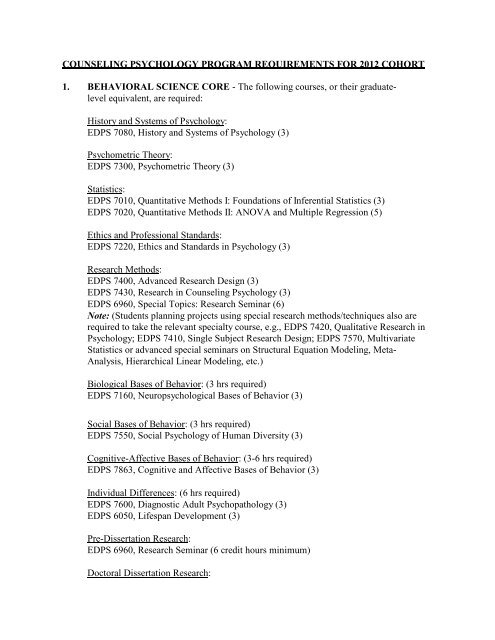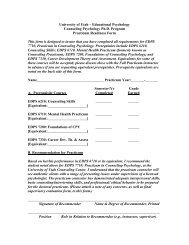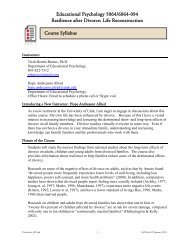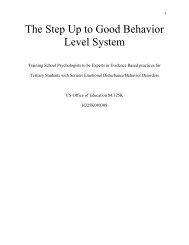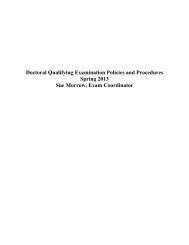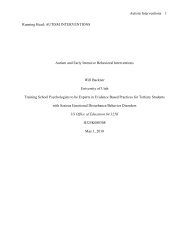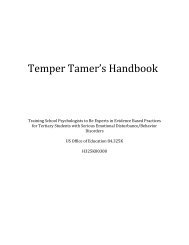CP Program Course Requirements - Department of Educational ...
CP Program Course Requirements - Department of Educational ...
CP Program Course Requirements - Department of Educational ...
Create successful ePaper yourself
Turn your PDF publications into a flip-book with our unique Google optimized e-Paper software.
COUNSELING PSYCHOLOGY PROGRAM REQUIREMENTS FOR 2012 COHORT<br />
1. BEHAVIORAL SCIENCE CORE - The following courses, or their graduatelevel<br />
equivalent, are required:<br />
History and Systems <strong>of</strong> Psychology:<br />
EDPS 7080, History and Systems <strong>of</strong> Psychology (3)<br />
Psychometric Theory:<br />
EDPS 7300, Psychometric Theory (3)<br />
Statistics:<br />
EDPS 7010, Quantitative Methods I: Foundations <strong>of</strong> Inferential Statistics (3)<br />
EDPS 7020, Quantitative Methods II: ANOVA and Multiple Regression (5)<br />
Ethics and Pr<strong>of</strong>essional Standards:<br />
EDPS 7220, Ethics and Standards in Psychology (3)<br />
Research Methods:<br />
EDPS 7400, Advanced Research Design (3)<br />
EDPS 7430, Research in Counseling Psychology (3)<br />
EDPS 6960, Special Topics: Research Seminar (6)<br />
Note: (Students planning projects using special research methods/techniques also are<br />
required to take the relevant specialty course, e.g., EDPS 7420, Qualitative Research in<br />
Psychology; EDPS 7410, Single Subject Research Design; EDPS 7570, Multivariate<br />
Statistics or advanced special seminars on Structural Equation Modeling, Meta-<br />
Analysis, Hierarchical Linear Modeling, etc.)<br />
Biological Bases <strong>of</strong> Behavior: (3 hrs required)<br />
EDPS 7160, Neuropsychological Bases <strong>of</strong> Behavior (3)<br />
Social Bases <strong>of</strong> Behavior: (3 hrs required)<br />
EDPS 7550, Social Psychology <strong>of</strong> Human Diversity (3)<br />
Cognitive-Affective Bases <strong>of</strong> Behavior: (3-6 hrs required)<br />
EDPS 7863, Cognitive and Affective Bases <strong>of</strong> Behavior (3)<br />
Individual Differences: (6 hrs required)<br />
EDPS 7600, Diagnostic Adult Psychopathology (3)<br />
EDPS 6050, Lifespan Development (3)<br />
Pre-Dissertation Research:<br />
EDPS 6960, Research Seminar (6 credit hours minimum)<br />
Doctoral Dissertation Research:
EDPS 7970, Thesis Research: Ph.D. (14 credit hours minimum)<br />
II<br />
PSYCHOLOGY PRACTITIONER CORE - The following courses are required:<br />
Assessment:<br />
EDPS 7130, Cognitive Assessment (3) EDPS 7180, Personality Assessment (3)<br />
EDPS 7330, Career Development Theory and Assessment (3)<br />
Note: Although not required, EDPS 7170, Application and Theory <strong>of</strong> Projective<br />
Techniques (3), and EDPS 7190, Applied Neuropsychological Assessment (3), are<br />
recommended for students with special interests in psychological assessment.<br />
EDPS 7150, Individual Child/Adolescent Assessment (3) is recommended for<br />
students with interests in child psychology.<br />
Intervention:<br />
EDPS 6200, Counseling Theories & Procedures (3)<br />
EDPS 6210, Counseling Skills (3)<br />
EDPS 6710, Practicum in Counseling (3)<br />
EDPS 6360, Multicultural Counseling (3),<br />
EDPS 7200, Foundations <strong>of</strong> Counseling Psychology (3)<br />
EDPS 7480, Supervision Theory and Practice (3)<br />
EDPS 7460, Psychological Consultation (3)<br />
EDPS 7350, Group Counseling Theory and Application (3)<br />
Note: The following intervention courses, although not required, represent important<br />
pr<strong>of</strong>essional skills that are highly valued in many work settings.<br />
EDPS 7860, Seminars in Counseling Psychology (Topics vary; may be repeated for<br />
credit. Seminars may help to fill the special pr<strong>of</strong>iciency requirement.)<br />
Human Diversity Electives: In addition to the required courses listed above in<br />
Multicultural Counseling (EDPS 6360) and Social Psychology <strong>of</strong> Human Diversity<br />
(EDPS 7550), students are encouraged to complete additional course work in human<br />
diversity which may be selected from the following or other courses on campus:<br />
Practica:<br />
EDPS 7710, Practicum in Counseling Psychology (3-3)<br />
EDPS 7711, Practicum Supervision (3-3)<br />
EDPS 7770, Field Practicum (usually at least 2 years)<br />
EDPS 7720, Practicum in Supervision (1)<br />
Note: At least 1,000 hours <strong>of</strong> supervised experience are required across the<br />
various practica.<br />
Internship:
EDPS 7890, Internship Prep Seminar<br />
EDPS 7920, Internship in Counseling Psychology (2 minimum, 1 Fall & 1 Spring<br />
<strong>of</strong> internship year)<br />
Note: All students are required to complete a 2,000 hour internship in pr<strong>of</strong>essional<br />
psychology consisting <strong>of</strong> either a year <strong>of</strong> full-time or two years <strong>of</strong> half-time<br />
supervised work.<br />
III. SPECIAL PROFICIENCY - After consultation with the student's faculty advisor,<br />
and with the approval <strong>of</strong> her or his supervisory committee, each student completes a minimum<br />
<strong>of</strong> 6 graduate semester hours or its equivalent in a special pr<strong>of</strong>iciency <strong>of</strong> the student’s choosing.<br />
<strong>Course</strong> work must represent an integrated whole and have a coherent focus.<br />
Examples <strong>of</strong> possible special pr<strong>of</strong>iciencies are identified below. Depending on the student's<br />
pr<strong>of</strong>essional goals and interests, other specializations or combinations <strong>of</strong> the areas noted<br />
below may be approved.<br />
Assessment<br />
Child/ Adolescent Psychology<br />
Family/Marriage/Couples<br />
Psychology Forensic Psychology<br />
Gender Psychology<br />
Adult Life-span Development<br />
Health Psychology<br />
Higher Education/College Student Personnel Work/College Teaching<br />
Individual/Group Psychotherapy<br />
Multicultural Psychology<br />
Human Diversity<br />
Neuropsychology,<br />
Applied<br />
Organizational Psychology and Consultation<br />
<strong>Program</strong> Development, Evaluation, and Administration<br />
Psychometric Theory/Test Construction<br />
Rehabilitation Psychology/Chemical Dependency Counseling<br />
Research Methods/Statistics<br />
Specific Intervention Models (e.g., Psychodynamic, Cognitive-<br />
Behavioral) Sport Psychology<br />
Substance Abuse<br />
Vocational Psychology/Career Counseling<br />
IV. ELECTIVES - In consultation with their supervisory committees, students may add<br />
elective courses to their programs <strong>of</strong> study that support their personal and pr<strong>of</strong>essional<br />
objectives.<br />
V. PRACTICA
EDPS 7710, Practicum in Counseling Psychology (2 semesters required)<br />
EDPS 7711, Practicum Supervision (2 semesters required)<br />
EDPS 7770, Field Practicum (generally two additional years)<br />
During the first year, students enrolling with a Bachelor’s degree (as well as those with a<br />
Master's degree who have not taken equivalent courses) take EDPS 7200 (Foundations <strong>of</strong><br />
Counseling Psychology), EDPS 6210 (Counseling Skills), EDPS 6710 (Counseling Practicum),<br />
and EDPS 7330 (Career Development Theory and Assessment), all prerequisites for EDPS<br />
7710 (Practicum in Counseling Psychology), an intensive core practicum located at the<br />
University Counseling Center. During the two semesters students are enrolled in EDPS<br />
7710/7711, prior coursework or concurrent enrollment is required in EDPS 7220 (Ethics and<br />
Standards), EDPS 7180 (Personality Assessment), EDPS 7360 (Multicultural Counseling), and<br />
EDPS 7600 (Diagnostic Psychopathology). No student will be permitted to enroll in either<br />
7710 or Field Practicum (EDPS 7770) unless he or she can document previous coursework in<br />
Psychological Ethics or is concurrently enrolled in EDPS 7220 (Ethics).<br />
In consultation with the program’s field practicum coordinator, students arrange various field<br />
practicum experiences (EDPS 7770) during their third and fourth years (or sometimes earlier<br />
if they matriculated into the doctoral program having completed an external Master’s degree<br />
that included supervised practicum training). Field practica take place in a variety <strong>of</strong><br />
pr<strong>of</strong>essional settings at the university and in the surrounding community, involve various<br />
client populations, and afford students opportunities to enhance and diversify their<br />
assessment and intervention skills. Enrollment in EDPS 7770 also includes mandatory<br />
attendance in the Pr<strong>of</strong>essional Issues Field Practicum Seminar scheduled during fall and<br />
spring Semesters. General prerequisites include successful completion <strong>of</strong> two semesters <strong>of</strong><br />
EDPS 7710/7711 or equivalent experiences in a prior Master’s program.<br />
NOTE: Any student engaged in the delivery <strong>of</strong> any psychological services must be<br />
enrolled in either EDPS 7710 or EDPS 7770. This includes the summer semester.<br />
A minimum <strong>of</strong> 1,000 hours is required across all practicum course work (EDPS 6710,<br />
7710, and 7770). The faculty's expectation is that the 1,000 required hours will be divided into<br />
at least 400 hours <strong>of</strong> direct service to clients, 200 hours <strong>of</strong> supervision divided approximately<br />
equally between individual one-to-one and small-group supervision formats, and 400 additional<br />
hours <strong>of</strong> indirect service and other practicum-related activities (e.g., writing case notes and<br />
client reports, conceptualizing cases and developing intervention strategies, preparing for<br />
supervision, consulting informally with colleagues, waiting for client appointments, and<br />
reviewing relevant texts and articles). It should be emphasized that 1,000 hours is the minimum<br />
number <strong>of</strong> practicum hours required. Given recent supply and demand issues related to APA<br />
approved pre- doctoral internship placements, students are strongly encouraged to accumulate<br />
more hours than is necessary to meet this requirement.<br />
Finally, students must co-lead at least 3 counseling, psychotherapy, or psychoeducational<br />
groups as part <strong>of</strong> the 400 required hours <strong>of</strong> direct client service. Coleadership <strong>of</strong> group<br />
interventions is self-reported by students in their Practicum Activity Logs. Prerequisites for
group leadership are completion <strong>of</strong> EDPS 7350 Group Psychotherapy Theory and Application)<br />
and at least one semester <strong>of</strong> EDPS 7710 (Practicum in Counseling Psychology).<br />
As part <strong>of</strong> the program's diversity and multicultural counseling requirement, at least 60 <strong>of</strong> the<br />
required 400 hours <strong>of</strong> direct service must be with clients from diverse and underrepresented<br />
groups. These hours spent working with underserved clientele are self-reported by students in<br />
their Practicum Activity Logs. Examples <strong>of</strong> diverse clientele include, but are not limited to,<br />
ethnic and cultural minorities, people with disabilities, gay/lesbian/bisexual/transgendered<br />
individuals, refugees, immigrants, individuals with AIDS or who are HIV positive, older<br />
adults, international students, people experiencing economic deprivation, disadvantaged<br />
children and youth, as well as other underrepresented groups with special needs such as<br />
religious minorities.<br />
In addition, at least 60 <strong>of</strong> the required 400 hours (15%) <strong>of</strong> direct service must emphasize the<br />
systematic gathering <strong>of</strong> information for the purpose <strong>of</strong> client assessment and conceptualization.<br />
Diagnostic interviewing and use <strong>of</strong> psychological tests and inventories are examples <strong>of</strong><br />
assessment activities. Hours spent providing assessment services are self-reported by students<br />
in their Practicum Activity Logs.<br />
Satisfactory completion <strong>of</strong> all practicum requirements, including the required 1,000 minimum<br />
hours, meets the supervised experience eligibility requirements <strong>of</strong> most predoctoral internship<br />
training sites and develops well-qualified and attractive internship candidates. A more detailed<br />
description <strong>of</strong> Field Practicum Policies and Procedures is located in Appendix B <strong>of</strong> the<br />
Counseling Psychology <strong>Program</strong> Handbook.<br />
Some behavioral healthcare training sites (e.g., VA hospitals) require 1200-1500 total<br />
practicum hours. For additional information concerning such exceptions, consult with the<br />
program training director, field practicum coordinator, and/or the latest APPIC Directory<br />
available in the department main <strong>of</strong>fice or on the web at http://www.appic.org/. See Appendix<br />
B in this Handbook for additional details about practicum policies and procedures.<br />
Students may arrange demonstration therapy experiences for themselves. Credentialed<br />
pr<strong>of</strong>essionals working in the community, not regularly involved in departmental teaching or<br />
research advisement, provide doctoral students with individual or group counseling/<br />
psychotherapy experiences. The program encourages use <strong>of</strong> sliding fee schedules, but students<br />
are responsible for making their own financial arrangements with their therapists. This is not a<br />
required part <strong>of</strong> the program but is available for interested students. For details, see your<br />
faculty adviser or the program's training director.<br />
VII.<br />
AUTHORSHIP/ CO-AUTHORSHIP ON PUBLICATION/ PRESENTATION<br />
Students are expected to contribute scholarship to the pr<strong>of</strong>ession during their tenure in the<br />
graduate program. As such, students are required to author or co-author a scholarly article<br />
submitted for publication to a peer-reviewed journal and to present at a regional or national
pr<strong>of</strong>essional conference prior to graduation. It is expected that work submitted for publication or<br />
presentation will be conducted at the University <strong>of</strong> Utah. Students should consult their advisor<br />
for guidance on what documentation will constitute adherence to this requirement.<br />
Documentation <strong>of</strong> compliance with this requirement must be available in the student’s file.<br />
VII.<br />
PRE-DISSERTATION RESEARCH PROJECT<br />
All students entering the Ph.D. program in Counseling Psychology are expected to complete a<br />
―Pre-Dissertation Research Project‖ which is articulated (see Appendix I) through a contract<br />
between the student’s program advisor and the student. The pre-dissertation project will be<br />
carried out within the formalized research teams within a two year time period. These teams meet<br />
in fulfillment <strong>of</strong> the research seminar course (ED PS 6960) in which the student must enroll each<br />
semester during the regular academic year during the student’s first two years <strong>of</strong> his or her<br />
program <strong>of</strong> study. Once completed, the pre-dissertation research project is submitted for review<br />
and ratification by the <strong>CP</strong> Committee as meeting the standard <strong>of</strong> a pre-dissertation ―Research<br />
Project.‖ This endorsement then allows the student to petition the <strong>CP</strong> Committee to sit for the<br />
doctoral comprehensive examination so that the student can then be admitted to doctoral<br />
candidacy. The steps in completing the pre-dissertation research project are as follows:<br />
1. When the student begins his or her first year <strong>of</strong> doctoral program, the student may or may<br />
not have a master’s thesis that was completed at the University <strong>of</strong> Utah or at another<br />
institution; that is, those students entering with a previous master’s degree MUST also<br />
complete a pre-dissertation research project and follow the same procedures for completing<br />
the research project as a student admitted with a bachelor’s degree.<br />
2. The student registers for 2 credit hours <strong>of</strong> Research Seminar (EDPS 6960) fall and spring<br />
semesters <strong>of</strong> the first academic year and 1 credit hour <strong>of</strong> EDPS 6960 <strong>of</strong> the fall and spring<br />
semesters <strong>of</strong> the 2 nd academic year (a total <strong>of</strong> 6 credit hours <strong>of</strong> EDPS 6960 in this two-year<br />
interval).<br />
3. Research Seminar (EDPS 6960) requirements are satisfied through the research team that is<br />
directed by a C<strong>CP</strong> faculty advisor. Student attendance at the Research Seminar is required.<br />
Students failing to attend on a regular basis may receive a NC (no credit) grade and be<br />
required to repeat this course prior to being authorized to sit for the doctoral qualifying<br />
examination.<br />
4. At the beginning <strong>of</strong> the fall semester the student and the faculty advisor develop a predissertation<br />
research project plan. The nature and design <strong>of</strong> this project plan is guided by<br />
the faculty advisor’s research expertise and skill. The content <strong>of</strong> the research project<br />
should be consistent with the faculty advisor’s research interests. A formal contract is then<br />
established between the student and the faculty advisor that includes a student<br />
commitment to complete a final Pre-dissertation Research Product to demonstrate<br />
fulfillment <strong>of</strong> the EDPS 6960 research seminar competency expectation. This contract<br />
must be approved by a majority vote <strong>of</strong> the C<strong>CP</strong> faculty no later than the mid-year faculty<br />
evaluation meeting (third Monday <strong>of</strong> November) but may be approved at any regularly
scheduled C<strong>CP</strong> faculty meeting.<br />
5. The pre-dissertation research product will be completed before the student’s final evaluation<br />
in the student’s 2 nd year <strong>of</strong> her or his program <strong>of</strong> study. A mid-year evaluation will be<br />
conducted for all second year students to assess progress towards meeting the predissertation<br />
research project.<br />
6. Students who don’t have an approved final PDRP project can register for qualifying exams<br />
and check the Conditional Registration box on the application. Deadlines for semester prior<br />
to the desired exam cycle). In order to be permitted to actually sit for the exam, however, the<br />
student must have submitted her or his final PDRP to the Training Director by August 1 (for<br />
fall exam cycle) or December 1 (for spring exam cycle) and must have the PDRP approved<br />
by the faculty at least 5 days prior to the first Qualifying Exam period. These deadlines are<br />
consistent with existing requirements that final PDRPs must be submitted at least two weeks<br />
prior to a normally scheduled faculty meeting. Under this new policy, faculty will have<br />
sufficient time to review and make final determination <strong>of</strong> a final PDRP at one <strong>of</strong> the first two<br />
regularly scheduled faculty meetings <strong>of</strong> the semester.<br />
7. A completed pre-dissertation research contract along with the final pre-dissertation<br />
research product must be submitted on or before the end <strong>of</strong> the student’s second year in<br />
the program. Evaluations <strong>of</strong> completed pre-dissertation research products and contracts<br />
will be reviewed at any regularly scheduled C<strong>CP</strong> faculty meeting. A student’s research<br />
product must be submitted at least two weeks prior to the regularly scheduled faculty<br />
meeting to accommodate distribution to faculty for evaluation.<br />
8. If the student is unable to complete the research product within the two year time frame, the<br />
student’s program <strong>of</strong> study will receive a probationary designation and the student must<br />
petition the C<strong>CP</strong> committee for up to, but more than, a one year extension. An extension<br />
MUST be approved by a formal vote by the C<strong>CP</strong> faculty and will be considered an<br />
―exceptional circumstance‖ as part <strong>of</strong> the student’s program progress. Students receiving<br />
such extensions will automatically be designated for ongoing mid-year student evaluations.<br />
Once the pre-dissertation research project requirement is completed, the student can then<br />
formally appeal to the <strong>CP</strong> Committee to request removal <strong>of</strong> the ―probationary designation‖<br />
from the student’s program <strong>of</strong> study.<br />
VIII. DOCTORAL QUALIFYING EXAMINATION<br />
The Doctoral Qualifying Examination (sometimes called the "preliminary" exam or "prelims")<br />
is an essential pre-requisite for advancing a student’s program <strong>of</strong> study to doctoral candidacy.<br />
Upon successful completion <strong>of</strong> the doctoral qualifying examination the student is formally<br />
admitted by the Graduate School to formal candidacy for the Ph.D. degree. To be eligible to sit<br />
for this doctoral qualifying examination the student must have: (1) completed the predissertation<br />
research project and have received approval <strong>of</strong> completion <strong>of</strong> this project by the<br />
Counseling Psychology Committee; (2) organized a doctoral supervisory committee that has
een approved by the <strong>Department</strong> <strong>of</strong> <strong>Educational</strong> Psychology and by the Graduate School; (3)<br />
filed a program <strong>of</strong> studies for the Ph.D. degree that has been approved by the <strong>Department</strong> <strong>of</strong><br />
<strong>Educational</strong> Psychology; (4) Provide evidence the there is no ―probationary designation‖ on the<br />
program <strong>of</strong> study. This means, for example, that there are no outstanding incompletes or issues<br />
on <strong>of</strong>ficial course transcripts or in the student’s permanent academic file; and (5) Have been<br />
endorsed to take prelim exams by the student’s supervisory committee.<br />
The doctoral qualifying examination is divided into two sections: Section I is a written<br />
qualifying examination that is administered by the <strong>CP</strong> Committee twice yearly in fall and<br />
spring semesters according to the printed schedule published by the <strong>CP</strong> <strong>Program</strong>. Students<br />
intending to take the doctoral qualifying examination must submit their completed doctoral<br />
qualifying examination registration form to the department <strong>of</strong>fice by the date specified in the<br />
current University <strong>of</strong> Utah <strong>Department</strong> <strong>of</strong> <strong>Educational</strong> Psychology Counseling Psychology<br />
<strong>Program</strong> Doctoral Qualifying Examination Guide (See Appendix in this document) issued at<br />
the time the student plans to take the examination.<br />
In the written section <strong>of</strong> the examination, faculty evaluate students written answers to<br />
questions that represent the following six knowledge domains:<br />
1. Measurement and Assessment<br />
2. Vocational Psychology and Career Development<br />
3. Research and Interventions in Counseling Psychology<br />
4. Methods <strong>of</strong> Quantitative Research Design and Analysis<br />
5. Ethical, Legal, and Pr<strong>of</strong>essional Issues in Psychology<br />
6. Multicultural Counseling and Human Diversity<br />
The second section <strong>of</strong> the doctoral qualifying examination consists <strong>of</strong> an oral<br />
examination. The oral section is a pr<strong>of</strong>essional/counseling skills domain that is evaluated<br />
through a work sample that is submitted to the Counseling Psychology <strong>Program</strong> Training<br />
Director or the Prelim Coordinator for initial screening and clearance one week after the written<br />
portion <strong>of</strong> the exam is completed. Approximately one month after completing the written exams,<br />
the <strong>of</strong>ficial oral examination is held, where members <strong>of</strong> the Counseling Psychology Committee<br />
examine the pr<strong>of</strong>essional/counseling skills <strong>of</strong> the student as represented in an oral presentation<br />
<strong>of</strong> the work sample material which includes a video- or audiotape presentation <strong>of</strong> the student’s<br />
counseling skills.<br />
The most current version <strong>of</strong> the document titled University <strong>of</strong> Utah <strong>Department</strong> <strong>of</strong> <strong>Educational</strong><br />
Psychology Counseling Psychology <strong>Program</strong> Doctoral Qualifying Examination Guide, along<br />
with the examination registration form, is available in the department <strong>of</strong>fice or from the program<br />
training director and is also found on the web at<br />
http://www.ed.utah.edu/edps/SAC/Info/info.htm. Appendix C <strong>of</strong> this document contains a copy<br />
<strong>of</strong> material current at the time <strong>of</strong> this handbook’s distribution. At the time the student is ready<br />
to take prelims, she or he should obtain an up-to-date copy <strong>of</strong> the Counseling Psychology<br />
Doctoral Qualifying Examination Policies and Procedures. Written questions from previous<br />
examinations are available for student review from the training director or the department
<strong>of</strong>fice.<br />
VIII.<br />
INTERNSHIP IN COUNSELING PSYCHOLOGY<br />
An internship in counseling psychology is required that consists <strong>of</strong> one calendar year <strong>of</strong> fulltime<br />
or two years <strong>of</strong> half-time (2,000 clock hours) supervised pr<strong>of</strong>essional work. Internship<br />
placements occur in a variety <strong>of</strong> agency and institutional settings as approved by the<br />
Counseling Psychology Committee. The specific standards the committee has adopted for<br />
defining acceptable predoctoral internships are listed in Appendix A <strong>of</strong> this document.<br />
The faculty recommend strongly that students accept internship placements in training<br />
agencies accredited by the American Psychological Association. Any exceptions to this<br />
policy must be approved in advance by the Counseling Psychology Committee.<br />
Some counseling psychology students accept internship placements with agencies in the<br />
surrounding community; whereas others accept assignments at various sites around the country.<br />
Settings in the local area with organized internship training programs in pr<strong>of</strong>essional<br />
psychology include:<br />
University <strong>of</strong> Utah Counseling Center (APA-accredited)<br />
Veterans Administration Regional Medical Center, Salt Lake City (APA-accredited)<br />
Valley Mental Health, Salt Lake City (APA-accredited)<br />
Primary Children's Medical Center, Psychiatric Services (APA-accredited)<br />
The Children's Center, Salt Lake City (APPIC-listed)<br />
University <strong>of</strong> Utah Neuropsychiatric Institute, Salt Lake City (APA-accredited)<br />
Brigham Young University Counseling and Career Center (APA-accredited)<br />
Utah State University Counseling Center (APA-accredited)<br />
Utah State Hospital (APA-accredited) Utah Valley University (APPIC listed)<br />
Wasatch Mental Health, Provo Utah (APA-accredited)<br />
To be eligible to apply for internship, students must have completed (1) all requirements for the<br />
Master's degree including the pre-dissertation research project; (2) all counseling practicum<br />
requirements (may be enrolled in but not completed field practicum); (3) academic requirements<br />
listed in Area I (Behavioral Science Core) and Area II (Psychology Practitioner Core) <strong>of</strong> this<br />
outline; and (4) the doctoral qualifying examination. In addition, the program requires that, prior<br />
to sending out applications for internship (as early as October the year prior to going on<br />
internship), students have their dissertation proposal approved by their doctoral committees.<br />
Students must take EDPS 7890, Counseling Psychology Internship Preparation Seminar the fall<br />
they apply for internships.<br />
Students must enroll in EDPS 7920, Internship in Counseling Psychology, during fall and spring<br />
semesters (1 credit hour per semester) <strong>of</strong> their internship placement year. In keeping with<br />
Graduate School policy, students must enroll in a total <strong>of</strong> at least 3 credit hours each semester<br />
(fall and spring) they are matriculated, including the year they are in residence at their<br />
internship assignment. This is usually accomplished by enrolling each semester in 1 hour <strong>of</strong>
EDPS 7920 (Internship) and 2 hours <strong>of</strong> EDPS 7970 (Thesis Research: Ph.D.). In addition, the<br />
APA Committee on Accreditation rules state that all program requirements, including the<br />
internship, must be completed prior to awarding the doctoral degree. Thus there are two<br />
possibilities for registration during the summer you are on internship: (1) If you plan to defend<br />
your dissertation the Fall after you have completed your internship or later (and will thus be<br />
registered for 3 semester hours <strong>of</strong> credit), you do not need to register for classes during the<br />
summer you finish your internship; (2) If you defend your dissertation and have all other<br />
requirements completed during the Spring semester you are on internship, you must register for<br />
1 credit <strong>of</strong> EDPS 7920, Internship.<br />
X. DOCTORAL DISSERTATION RESEARCH<br />
Students are responsible for requesting approval for their doctoral supervisory committee<br />
consisting <strong>of</strong> a chair and four additional faculty, one <strong>of</strong> whom is appointed by the Director <strong>of</strong><br />
Graduate Studies (see Appendix F for Supervisory Committee Guidelines). The chair must be a<br />
faculty member in the <strong>Department</strong> <strong>of</strong> <strong>Educational</strong> Psychology. At least one member <strong>of</strong> the<br />
committee must represent the Counseling Psychology Committee, and one other member must<br />
hold faculty rank in a department other than <strong>Educational</strong> Psychology.<br />
Dissertation research credits are accumulated under EDPS 7970 (Thesis Research: Ph.D.), and<br />
the Graduate School requires that at least 14 dissertation credit hours are represented on the<br />
student’s transcript. <strong>Requirements</strong> include an open colloquium meeting on the dissertation<br />
proposal conducted by the student's supervisory committee and a final oral defense <strong>of</strong> the<br />
completed dissertation. The student first completes a dissertation proposal, which is formulated<br />
in cooperation with the supervisory committee chairperson and later approved by the student's<br />
entire committee at the colloquium meeting. Two weeks before the colloquium, the student<br />
must give a copy <strong>of</strong> the proposal to each committee member and one copy to the Academic<br />
<strong>Program</strong> Specialist. A variety <strong>of</strong> dissertation topics and research methodologies are possible.<br />
The student is expected to complete research <strong>of</strong> scholarly merit and <strong>of</strong> significance to the field.<br />
It is common for the student’s dissertation research project to follow from the work that the<br />
student has engaged in as part <strong>of</strong> his or her pre-dissertation research project. The Graduate<br />
School requires enrollment in at least 3 semester hours <strong>of</strong> doctoral coursework credit during the<br />
semester the final oral examination is held.


